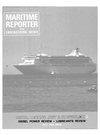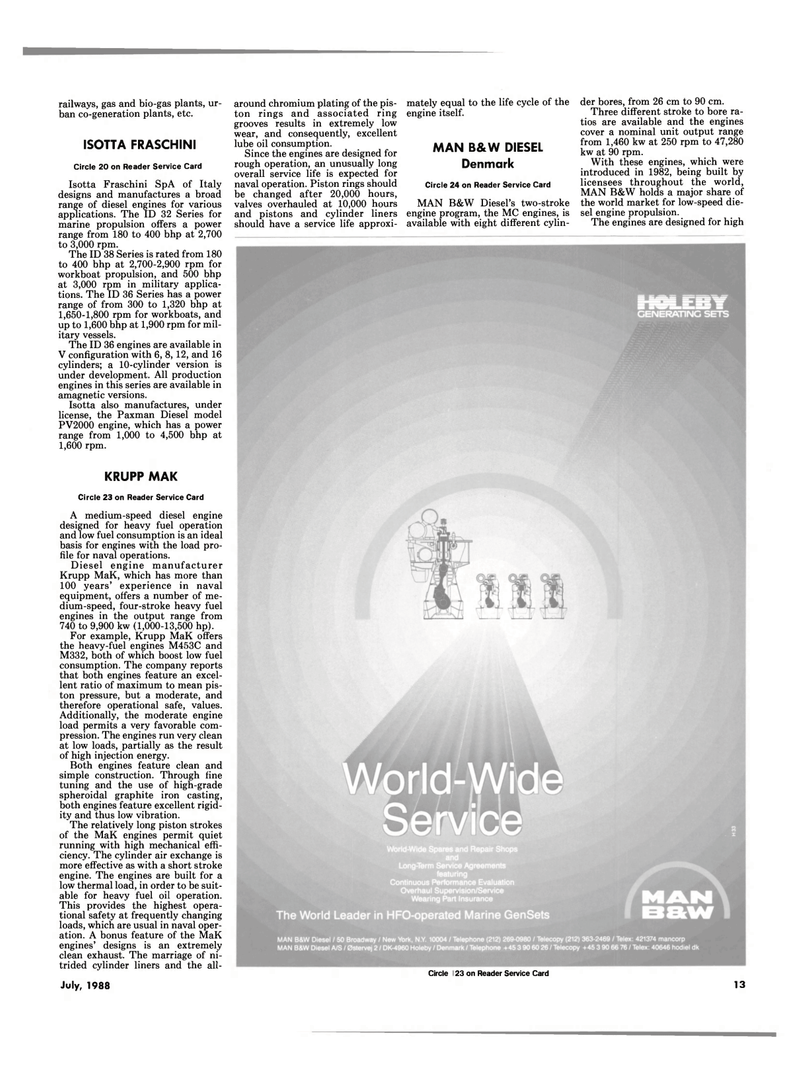
Page 11: of Maritime Reporter Magazine (July 1988)
Read this page in Pdf, Flash or Html5 edition of July 1988 Maritime Reporter Magazine
railways, gas and bio-gas plants, ur- ban co-generation plants, etc.
ISOTTA FRASCHINI
Circle 20 on Reader Service Card
Isotta Fraschini SpA of Italy designs and manufactures a broad range of diesel engines for various applications. The ID 32 Series for marine propulsion offers a power range from 180 to 400 bhp at 2,700 to 3,000 rpm.
The ID 38 Series is rated from 180 to 400 bhp at 2,700-2,900 rpm for workboat propulsion, and 500 bhp at 3,000 rpm in military applica- tions. The ID 36 Series has a power range of from 300 to 1,320 bhp at 1,650-1,800 rpm for workboats, and up to 1,600 bhp at 1,900 rpm for mil- itary vessels.
The ID 36 engines are available in
V configuration with 6, 8,12, and 16 cylinders; a 10-cylinder version is under development. All production engines in this series are available in amagnetic versions.
Isotta also manufactures, under license, the Paxman Diesel model
PV2000 engine, which has a power range from 1,000 to 4,500 bhp at 1,600 rpm.
KRUPP MAK
Circle 23 on Reader Service Card
A medium-speed diesel engine designed for heavy fuel operation and low fuel consumption is an ideal basis for engines with the load pro- file for naval operations.
Diesel engine manufacturer
Krupp MaK, which has more than 100 years' experience in naval equipment, offers a number of me- dium-speed, four-stroke heavy fuel engines in the output range from 740 to 9,900 kw (1,000-13,500 hp).
For example, Krupp MaK offers the heavy-fuel engines M453C and
M332, both of which boost low fuel consumption. The company reports that both engines feature an excel- lent ratio of maximum to mean pis- ton pressure, but a moderate, and therefore operational safe, values.
Additionally, the moderate engine load permits a very favorable com- pression. The engines run very clean at low loads, partially as the result of high injection energy.
Both engines feature clean and simple construction. Through fine tuning and the use of high-grade spheroidal graphite iron casting, both engines feature excellent rigid- ity and thus low vibration.
The relatively long piston strokes of the MaK engines permit quiet running with high mechanical effi- ciency. The cylinder air exchange is more effective as with a short stroke engine. The engines are built for a low thermal load, in order to be suit- able for heavy fuel oil operation.
This provides the highest opera- tional safety at frequently changing loads, which are usual in naval oper- ation. A bonus feature of the MaK engines' designs is an extremely clean exhaust. The marriage of ni- trided cylinder liners and the all-
July, 1988 around chromium plating of the pis- ton rings and associated ring grooves results in extremely low wear, and consequently, excellent lube oil consumption.
Since the engines are designed for rough operation, an unusually long overall service life is expected for naval operation. Piston rings should be changed after 20,000 hours, valves overhauled at 10,000 hours and pistons and cylinder liners should have a service life approxi- mately equal to the life cycle of the engine itself.
MAN B&W DIESEL
Denmark
Circle 24 on Reader Service Card
MAN B&W Diesel's two-stroke engine program, the MC engines, is available with eight different cylin- der bores, from 26 cm to 90 cm.
Three different stroke to bore ra- tios are available and the engines cover a nominal unit output range from 1,460 kw at 250 rpm to 47,280 kw at 90 rpm.
With these engines, which were introduced in 1982, being built by licensees throughout the world,
MAN B&W holds a major share of the world market for low-speed die- sel engine propulsion.
The engines are designed for high
Circle 237 on Reader Service Card 13

 10
10

 12
12
